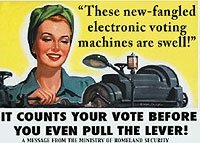Thursday, March 02, 2006
Mixed bag
 Pennsylvania's courts offered a mix of rulings and decision this week that may directly affect many state residents.
Pennsylvania's courts offered a mix of rulings and decision this week that may directly affect many state residents.First off, the high court ruled Thursday that Westmoreland County - and 34 other counties - may replace its mechanical lever voting machines without voter approval in a case that pitted new federal election laws against the state constitution.
But in true Pennsylvania fashion, the justices decided not to justify their decision with an actual opinion. Instead, the ruling, which overturned a lower court, was announced in a one-page order that promised an opinion later explaining the reasoning - assuming of course they can conjure one up that makes sense.
The counties must meet new federal election standards by the upcoming primary or the state and counties risk losing part of nearly $135 million in federal funds.
 Meanwhile, the Administrative Office of Pennsylvania Courts, which oversees the state and county court system, took input today on a new policy that may change what residents can read about court cases on the Internet.
Meanwhile, the Administrative Office of Pennsylvania Courts, which oversees the state and county court system, took input today on a new policy that may change what residents can read about court cases on the Internet.As a journalist, I am in favor of posting everything on the Web, for good or ill. If it's a public record it should be available for public consumption, period, not hidden away until a case is decided.
But Larry Frankel, the Pennsylvania legislative director for the American Civil Liberties Union, was among several people who argued that criminal case records should not be on the Internet before a defendant is adjudicated guilty. Frankel said many people wrongly consider an arrest equivalent to a conviction.
"We think that excluding such information will greatly enhance the privacy rights of all Pennsylvanians," Frankel said.
Alan M. Feldman, chancellor for the Philadelphia Bar Association, agreed saying posting information about someone who has not been found guilty could unfairly tarnish their reputation.
But Pennsylvania Newspaper Association lawyer Teri Henning argued, "The fact that someone has been charged with a crime is significant. It is also public information."
 Finally, on Tuesday, the Supremes ruled sheriffs' deputies are not law enforcement officers as defined by state law and therefore can not engage in electronic eavesdropping.
Finally, on Tuesday, the Supremes ruled sheriffs' deputies are not law enforcement officers as defined by state law and therefore can not engage in electronic eavesdropping.Justice Sandra Schultz Newman's majority opinion found sheriffs and deputies do not have more power than private citizens to make arrests for crimes they witness.
Considering many deputies are political appointees here, and Pennsylvania is one of the leading states in abusing criminal records for private and political purposes, this ruling makes a lot of sense.
 |
| 
Wednesday, March 01, 2006
Paper or plastic?
 Proving once again that they can't fight their way out of a paper bag, county officials in Pennsylvania took their fight to buy new electronic voting machines to the state Supreme Court today.
Proving once again that they can't fight their way out of a paper bag, county officials in Pennsylvania took their fight to buy new electronic voting machines to the state Supreme Court today.Buying new plastic machines to replace old lever-based metal behomeths and paper punch cards seems like such a simple thing, especially since a 2002 federal law requires 35 of the state's 51 counties - including Bucks County - to make the switch.
There's just one catch.
The federal Help America Vote Act conflicts with Pennsylvania's state constitution, which requires counties to put any change in voting system to a vote using the old machines.
And the U.S. Justice Department has told the state it has authorized a lawsuit to force Pennsylvania to comply with the law and that neither paper ballots nor lever machines would satisfy a provision of the law that requires voting places to be accessible to disabled voters.
The simple solution would be for Gov. Ed Rendell to step in, ask the Feds for a stay on their suit and force the counties to put the issue on their ballots in the May primary.
Rendell should have done that immediately after Commonwealth Court Judge Dan Pellegrini recently halted - at least temporarily - Westmoreland County's plans to replace its machines.
Instead, the county election board and state elections officials told the Supreme Court there is not enough time to hold a referendum and replace the older systems before the primary.
They also rejected Pellegrini's suggestion that they simply use the old machines for state and local elections - including the governor's race - and paper ballots for the federal ones.
"Imagine when that election will be certified," Mark Aronchick, a private attorney hired by the state, said Wednesday.
Justice Sandra Schultz Newman agreed, "In reality, paper ballots in 24 counties seems to me would wreak havoc."
 |
| 
Tuesday, February 28, 2006
Too little, but never too late
 Pennsylvania Attorney General Tom Corbett announced the formation of a seven-attorney unit today to investigate corruption allegations involving elected officials and government employees.
Pennsylvania Attorney General Tom Corbett announced the formation of a seven-attorney unit today to investigate corruption allegations involving elected officials and government employees.The unit's responsibilities will include investigating serious allegations of election-law violations, complaints referred by the State Ethics Commission, and conflict-of-interest cases referred by county district attorneys, Corbett said.
That also lead him to make the understatement of the young year so-far: "By creating a Public Corruption Unit, the Attorney General's Office is putting a spotlight on investigating and prosecuting public corruption cases at a crucial time in our state's history when slot machines and casino gaming is about to become reality."
Corbett established a similar unit during a previous stint as attorney general. He was appointed to the office in 1995 by then-Gov. Tom Ridge to serve the last 15 months of the term of Ernest Preate Jr. after Preate was sent to prison for mail fraud in connection with politicial contributions from video poker machine vendors.
Yeah, right. Like Preate's arrest really sparked a reform movement or curbed the idea of legalized gambling.
Given the ongoing indictments in Philly, the constant shenanigans in Harrisburg, not to mention outright thievery throughout the state, I have to question whether this is just more lip service and C.Y.A.
After all, the bulk of these cases will likely be referrals only, not independent probes sparked by tipsters.
 |
| 
Monday, February 27, 2006
Slimey, reptillian insurance practices
 First, insurance companies started charging smokers more for health insurance.
First, insurance companies started charging smokers more for health insurance.Even as a reformed cigarette smoker, I think it stinks. It's discriminatory. But at least I can understand it. While no tobacco executive has ever been prosecuted, it's pretty clear that smoking eventually kills you.
And even if you're an addict, you know you're doing something unhealthy so it's fair to charge you $20 to $50 more a month for putting yourself at risk.
This, however, isn't fair.
In New Jersey, auto insurers are starting to charge less-educated blue collar workers more.
Yep, you read it right. The Geico gecko is a fucking elitist and is now charging professional and college-educated customers less.
 The Star-Ledger of Newark found that a 30-year-old single, male lawyer with a master's degree would pay $1,686 a year for coverage from Geico, but $2,880 if he was a janitor with a high school diploma.
The Star-Ledger of Newark found that a 30-year-old single, male lawyer with a master's degree would pay $1,686 a year for coverage from Geico, but $2,880 if he was a janitor with a high school diploma.According to the state Department of Banking and Insurance, the practice of using education and occupation to determine rates is acceptable if the company proves those items correlate to losses.
"They were able to justify it. We didn't have a reason to say 'No, you can't,'" department spokeswoman Jaimee Gilmartin said. "I don't know that we've gotten a single question or complaint with regard to use of education or occupation."
That's probably because no one knew how badly they're being screwed or the justification for their rates, which are still far higher than those in the Philly area.
 Assemblyman Neil Cohen, D-Union County, vowed Monday to introduce a bill to ban the practice, saying a person's occupation "has no relationship to how somebody drives."
Assemblyman Neil Cohen, D-Union County, vowed Monday to introduce a bill to ban the practice, saying a person's occupation "has no relationship to how somebody drives."Phyllis Salowe-Kaye, executive director of New Jersey Citizen Action, called the practice "unconscionable" and advised customers to lie on their application forms and say they are "Rhodes scholars."
Insurance companies already have access to the most sensitive information about us. All they'll need is a blood sample and they can soon start charging you more simply because you're genetically predisposed to an illness.
Gattaca, here we come.
 |
| 
This Week's Rants | The Daily Rant Archives

This work is licensed under a Creative Commons Attribution 2.5 License.

This work is licensed under a Creative Commons Attribution 2.5 License.


